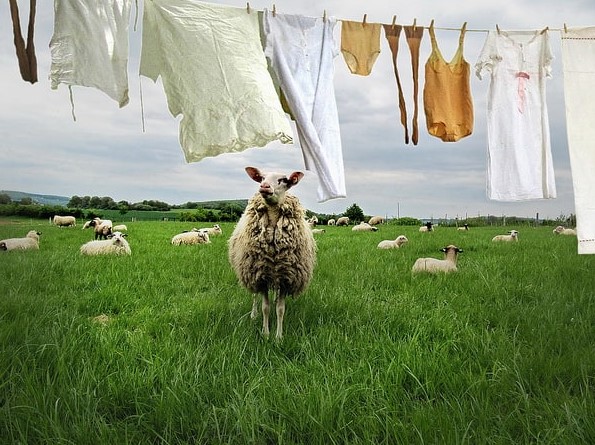No one – and I really mean no one Irish – knows more about the importance of the washing line in culture and childhood. In Ireland, the rules and protocols are up there with the beloved immersion heater and fireplace.
Pass any row of Irish back gardens from the early
twentieth century, even with the rise of apartment blocks (with front
balconies) in the 1950s and daily you witnessed a sea of washing lines strung
out with clothes to dry for the day.
They were, essentially, a host of lives exposed from
early morning until sunset. There is quite no other symbol of putting your
life, and the lives of your whole family on bare display.
Nosy neighbours, just on observation of the vista of
clothes lines in the locale could extract fundamental details of family activities
and behaviour.
Such examples of which might be – from neighbour to
neighbour gossip over a garden wall:
‘’I see young Audrey at number 7 must be pissing the
bed again during the night. Bed sheets out on the line for the 5th
day running! Jaysus, Mrs Murphy must be fed up with that one.’’
‘’And, number 43, your man- Mrs Brown’s husband, the
brickie on the sites, must be pulling another long-term sickie from work.
Haven’t seen his work overalls on the line for five weeks. Probably in the pub
all day!’’
‘’I’ve said it before, Mary. I’ll say it again. That
O’Toole one with the four kids, barely a year apart – too loose for my likin’
and she only three year married. And did ye see the frilly knickers on the line
this mornin’? Five pair – black, red, purple and pink… Pink… mind you. Excuse
us. What proper church-going family woman needs five pair for two days?’’
‘’Number 50, haven’t see a line out the garden in a
week. Tumble dryer, I’d say. The likes of them, and in this street. Well for
some to be affordin’ a tumble dryer and him only workin’ in a sweet shop. And
well for some when me and Peter can barely afford the logs and coal for the
fire of an evenin. Next, it ‘ill be a fuckin’ microwave.’’
‘’There he was in Dunne Stores, buyin’ pegs for the line,
you know, for herself. Says I to him, plastic is it now? What’s the problem
with a bit of wood peg for the line. Say he, oh, we’ve got one of those
rotating-in-the-wind clothes lines – and says he, Linda thinks plastic coloured
pegs are better. Says I, and does it make the fuckin’ breakfast, dinner and tea
for ye as well, like Linda?’’
‘’So, I said to the Garda when he called to the house,
makin’ enquiries. Nice young chap, from Donegal. I invited him in, as ye would,
and we had a chat, a pot of tea and a half-pack of Garibaldi biscuits. I says
to the Garda at the kitchen table, if Mrs Moore is missing nearly a week, no
sight nor sound of her, then that Barney fella she’s shacked up with did away
with her. Check the back garden. There’s been no washin’ or dryin’ in that
house since last Tuesday. Mark my words. That’s not Mrs Moore’s way. She’d
never miss a good dryin’ day, not with the weather over the past week.’’
‘’I watched her the whole time. I mean who hangs the
whole washing out without the wipe of an oul cloth on the line? And them trees
overhanging her garden and the birds shittin’ everywhere. I don’t know, some
people!’’
‘’Three lines out. A whole week’s wash out. And the
six of them inside watching Ben-Hur on the BBC of a Saturday afternoon. Lazy
shits! I told them twice, it’s going to rain. Be fuckin’ ready for a military
clothes line evacuation. Eldest and best skilled for the unpegging and youngest
for the basket. Yiz had better be ready when I scream from the kitchen. 1 pm
and the heavens opened. De ye think one of them would get up off their arses
and lift a finger to give me a hand to get the washing in? Not-at-all. And the
Laurence youngfella then starts moanin’ on Sunday because his football gear
wasn’t dry for his match!’’
‘’So, the fella in the hardware says standard or
rotary clothes line? I swear, Mar, I could have swung for him. My mam would
turn over in her grave if she knew I went for rotary. She wouldn’t speak to me
for three weeks when I switched from Percil to Johnsons washing powder.’’
‘’I said to George, I want those new pulley wheel
lines. I’m fed up pickin’ clothes up off the grass because you stick a few
nails up in the house wall to the garden wall and they come out after I put two
blouses and three knickers up on the line. I let him go to work now in damp
jeans!’’
‘’So, I says to her, it’s either a proper and
traditional clothes line like me mam’s one and I’ll put it up tomorrow for you
or an expensive tumble dryer we can’t afford. I laughed and went to the pub.
Mind you, I learned that I’m going to the appliance shop today!’’



Comments
Post a Comment